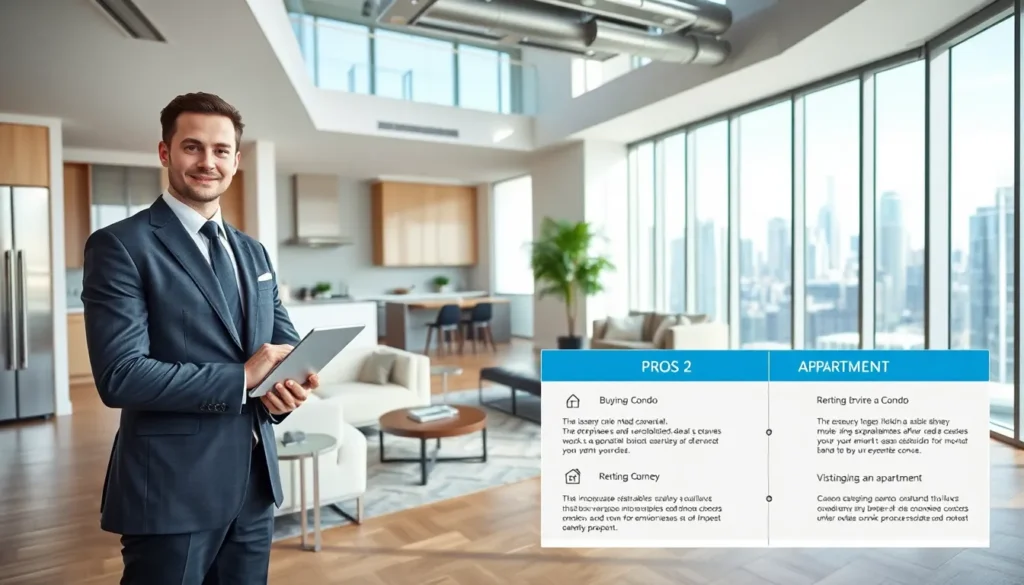Table of Contents
ToggleWhen it comes to the age-old debate of renting versus buying a home, opinions can vary as widely as the selection on a pizza menu. He loves renting for the flexibility, she champions the pride of homeownership. But what’s the real story? Delving into the benefits of renting versus buying can not only enhance financial literacy but also make the decision a whole lot easier (and less stressful). Let’s explore the key differences and find the path that suits your lifestyle best.
Understanding Renting and Buying

Renting involves leasing a property, typically on a short- or long-term basis. Here, the tenant pays a monthly fee to live in someone else’s property. On the flip side, buying means purchasing a home outright or through a mortgage, becoming the owner responsible for the entirety of the dwelling. This fundamental difference sets the stage for numerous other factors that influence financial decisions, lifestyle choices, and personal goals.
Financial Considerations
Let’s jump into the dollar signs, after all, money talks. Renting usually requires lower upfront costs. Typically, a security deposit and first month’s rent can get someone into a charming apartment without very costly. Conversely, buying often includes hefty costs like down payments, closing costs, and maintenance. It’s essential for potential homeowners to understand their credit scores and secure a mortgage rate before jumping into the market.
Renters, meanwhile, may benefit from fixed rental prices. Landlords can only increase rents at certain intervals. This predictability makes budgeting easier. But, mortgage payments can fluctuate if they are tied to variable interest rates.
Plus to upfront costs, renters avoid the unexpected expenses that often accompany homeownership, such as property taxes, insurance, and repairs. Those hefty bills can accumulate quickly, leading to financial strain.
Flexibility and Mobility
Although the thought of investing in a home can be enticing, flexibility is where renting shines bright like a diamond. Renters often enjoy the freedom to relocate with ease. Whether it’s a job opportunity across the country or a desire for a change of scenery, renters can simply give notice and move on. For those who value adventure or anticipate significant lifestyle changes, renting might feel like a breath of fresh air.
In stark contrast, homeowners may find themselves anchored to their properties, which can make relocating more complicated. Selling a house requires time, effort, and possibly losses if the market isn’t favorable. Hence, those pursuing a transient lifestyle may find greater comfort in renting.
Maintenance Responsibilities
Imagine living life without the constant worry about home repairs. Renters often have this luxury as maintenance tasks, think leaky faucets or broken appliances, typically fall on the landlord’s shoulders. That means time and energy spent on home repairs can be redirected to more enjoyable pursuits, such as hiking, dining out, or binge-watching the latest streaming series.
In contrast, homeowners shoulder all maintenance responsibilities, which can be burdensome. Not only do they have to pay out of pocket for repairs, but they also dedicate precious weekends to home upkeep. This scenario can sometimes lead to stressed-out homeowners swapping out not-so-fun household chores instead of enjoying time with family or hobbies.
Investment Potential
While renting offers immediate benefits, buying a home can be seen as a long-term investment. As property values tend to appreciate over time, homeowners can build equity, transforming what may have begun as a hefty mortgage into a valuable asset. This could potentially lead to increased financial security down the road.
But, investing in property can be tricky. Markets fluctuate, and an area once seen as desirable can quickly decline. This risk isn’t present for renters who enjoy the benefits of a home without the burden of an investment crash.
Social and Lifestyle Factors
Purchasing a home comes with social implications too. There’s often a sense of community that many find appealing, particularly in family-friendly neighborhoods with schools and parks. Getting involved within the community can create a warm feeling of belonging.
Nevertheless, some may find that renting suits their lifestyle better. Young professionals or individuals without significant ties may prioritize convenience and modern amenities offered in rental communities. Social connections can form through neighbors and events hosted in rental properties creating a lifestyle where activity reigns supreme.




